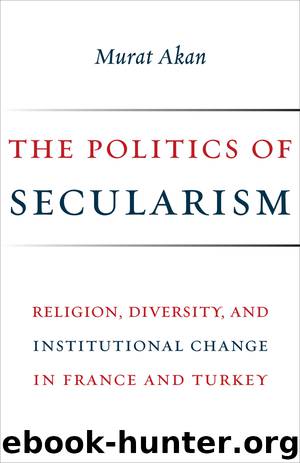The Politics of Secularism by Murat Akan

Author:Murat Akan
Language: eng
Format: epub
Publisher: Columbia University Press
The Institutional Politics of Laiklik in the Writing of the 1961 Constitution
During my interview on October 29, 2009, with Vakur Versan, one of the ten professors who wrote the first draft of the Turkish constitution of 1961, he recalled a conflict in the Professors’ Commission:
The constitution was finished. We made it. Outside, an army major is waiting. He will take it to Ankara. Muammer Aksoy hesitated for a moment. I tell you historical matters that nobody knows, it is very correct that you record them. Sıddık Sami turned to Muammer and said, “Muammer what happened? Something worries you.” Indeed, we have agreed and finished, we will give it to the army major, he will take it to Ankara, and there it will be approved and become the constitution. “Yes, I have, professor,” he said, “in the second article we say that Turkey is a laic state, and after, when we come to the section on the administration, we put in the constitution the Directorate of Religious Affairs, an institution that has nothing to do with laiklik and engages in religious affairs.”68
This conversation took place in 1961, during the final session of the Professors’ Commission, between the head of the commission, Sıddık Sami Onar, and a member, Muammer Aksoy. Onar’s book, İdare Hukukunun Umumi Esasları (Public foundations of administrative law), first published in 1952, defined laiklik as the institutional separation of religion and state and strictly pointed out that religious services are not public services and the existence of the DRA cannot be reconciled with the principle of laiklik; therefore its presence is better explained by political principles and regarded as a temporary “policing [zabıta] precaution necessitated by the particular time and context of the revolution [inkılap].”69
From the position of an academic observer of the contradictions of laiklik in 1952, in 1961 Onar had turned into one of the subjects who instituted such contradictions in practice. To Aksoy’s critical remarks cited above, he responded reaffirming what he saw as the still continuing particularities of the Turkish context:
Muammer, we discussed all these and reached this point, since you still have a concern, let’s go over it. Now, you are right, there are articles in contradiction with the statement of laiklik in article 2, but these emerge from the necessities [zaruret] of Turkey.… Even if today religious affairs are under the control of the state, we still cannot prevent reactionism [gericilik]. And if we leave it [religion] free, it will altogether act against laiklik. In Turkey, in this society, it is still necessary to keep it under state control.70
In fact, the Professors’ Commission’s draft of article 12 (later article 19) on freedom of religion also had a paragraph on religious education (later removed), which has been widely ignored in the literature. The paragraph read: “The State, with the condition of compliance with the essentials of the constitution, establishes public services and the necessary organization which will provide for the religious needs or religious education and instruction of the majority of the people or if necessary for those belonging to a minority religion or sect.
Download
This site does not store any files on its server. We only index and link to content provided by other sites. Please contact the content providers to delete copyright contents if any and email us, we'll remove relevant links or contents immediately.
| Anthropology | Archaeology |
| Philosophy | Politics & Government |
| Social Sciences | Sociology |
| Women's Studies |
The Secret History by Donna Tartt(19045)
The Social Justice Warrior Handbook by Lisa De Pasquale(12185)
Thirteen Reasons Why by Jay Asher(8889)
This Is How You Lose Her by Junot Diaz(6875)
Weapons of Math Destruction by Cathy O'Neil(6264)
Zero to One by Peter Thiel(5786)
Beartown by Fredrik Backman(5737)
The Myth of the Strong Leader by Archie Brown(5496)
The Fire Next Time by James Baldwin(5429)
How Democracies Die by Steven Levitsky & Daniel Ziblatt(5211)
Promise Me, Dad by Joe Biden(5141)
Stone's Rules by Roger Stone(5080)
A Higher Loyalty: Truth, Lies, and Leadership by James Comey(4948)
100 Deadly Skills by Clint Emerson(4919)
Rise and Kill First by Ronen Bergman(4777)
Secrecy World by Jake Bernstein(4740)
The David Icke Guide to the Global Conspiracy (and how to end it) by David Icke(4699)
The Farm by Tom Rob Smith(4502)
The Doomsday Machine by Daniel Ellsberg(4484)
